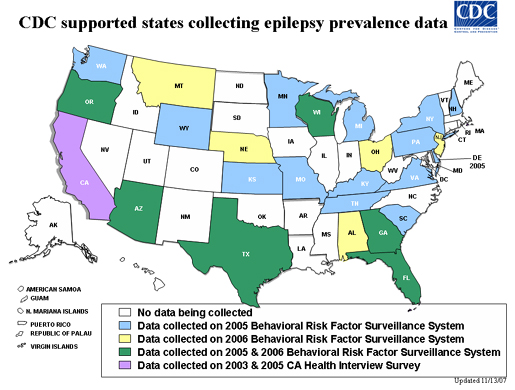 |
|
 |
 |
 |
State Activities

Florida
The Florida Epilepsy Services Program was established in 1974 through the efforts
of a number of dedicated individuals. Currently, the Florida Department of
Health administers the program, and services are coordinated by
epilepsy
services providers.*
Client services* include medical care and case management
for patients who have had seizures. Services are provided to children and adults
who have epilepsy and live in Florida—even in the most remote areas of
the state. The Epilepsy Services Program also has a
prevention and education* component. This component teaches both
professionals and the general public about preventing epilepsy, recognizing
seizures, and administering proper seizure first aid; it also dispels myths about seizure
disorders. The availability of medications is a critical component in
Florida's comprehensive program for people with epilepsy. The Florida
Department of Health administers the Antiepileptic Drug Program for
low-income Floridians. Many commonly prescribed medications for epilepsy are
available through the county health departments.
For more information, please contact:
Florida Department of Health, Epilepsy Program Office
4025 Esplanade Way,
Suite 130P
Tallahassee, FL 32399-0700
(850) 245-4330
Web site: http://www.doh.state.fl.us/family/epilepsy/default.html*
Texas
The 67th Texas Legislature authorized the Texas Department of Health (TDH)
to establish the Epilepsy Program. The Epilepsy Program is administered by
the Bureau of Kidney Health Care. Services are provided through contracts
with nonprofit and governmental agencies to provide comprehensive outpatient
care for persons with epilepsy or seizure-like symptoms. The program serves
persons with epilepsy who are not eligible for Medicaid, Medicare, or the
Chronically Ill and Disabled Children's Program. Clients must meet income
eligibility requirements and be a Texas resident. Service providers may charge the client
a percentage of the cost of providing services based upon a percentage by
which the client's income exceeds the established "poverty income
guidelines." No one is refused services for inability to pay.
Services may include:
- Diagnosis and treatment of the medical condition.
- Use of case management system to provide continuity of care.
- Integration of personal, social, and vocational support services.
- Public awareness and educational services.
For more, visit
http://www.dshs.state.tx.us/epilepsy/default.shtm.*
* Links to non-Federal organizations are
provided solely as a service to our users. Links do not constitute an
endorsement of any organization by CDC or the Federal Government, and none
should be inferred. The CDC is not responsible for the content of the individual
organization Web pages found at this link.
Date last
modified: 01/17/2007
Date last reviewed: 01/17/2007
Content source: Division of Adult
and Community Health, National Center for Chronic Disease Prevention and
Health Promotion |
 |